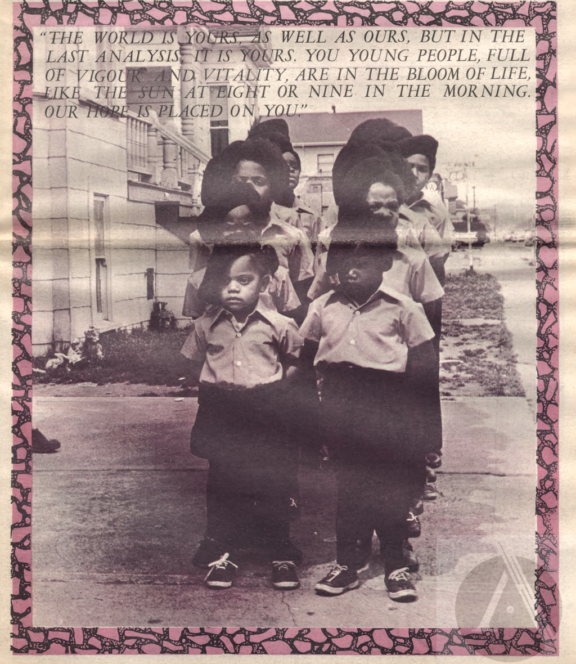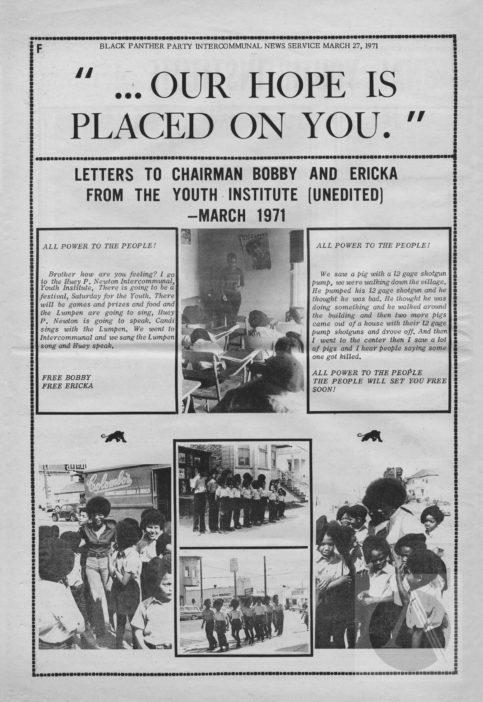 The cover of this issue of The Black Panther newspaper featured the image of a line of schoolchildren dressed in button-downs and the signature Black Panther beret, accompanied by an unattributed Mao Zedong quote describing the role of the youth in creating a better future. The students of the newly founded Intercommunal Youth Institute showcase looks of determination befitting young revolutionaries. The Mao quote appears again on page 24, embossed on an image of the children reading the BPP newsletter, edited in a style evocative of communist imagery.
The cover of this issue of The Black Panther newspaper featured the image of a line of schoolchildren dressed in button-downs and the signature Black Panther beret, accompanied by an unattributed Mao Zedong quote describing the role of the youth in creating a better future. The students of the newly founded Intercommunal Youth Institute showcase looks of determination befitting young revolutionaries. The Mao quote appears again on page 24, embossed on an image of the children reading the BPP newsletter, edited in a style evocative of communist imagery.
The photo is part of a spread entitled “…Our Hope is Placed on You,” which interlays photos of students’ daily lives at school with the Black Panther symbol and letters to Ericka Huggins and Bobby Seale, incarcerated at the time. The letters call for their release and reflect the revolutionary Panther ideology, with phrases such as “ALL POWER TO THE PEOPLE!” “YOUTH MAKES THE REVOLUTION” and “FREE BOBBY SEALE,” as well as descriptions of the new school and denunciations of “pigs.” One letter addressed to Ericka reads, “I have learned a lot in the Huey P Newton Youth School. We looks nice like little revolutionary should look like. We go sale papers like little revolutionary but some of the little revolutionary get out of hand and have to be dealt with after being in the field.” The children’s self-identification as no different than the adult revolutionaries in their lives, if only a bit smaller, reflects the ideology of equality and mutual respect guiding the IYI.
The spread includes an article, highlighted in pink, titled the “Huey P Newton Intercommunal Youth Institute.” The article outlines the reasons for the establishment of the institute as well as the structure of the school. It discusses the Panther belief that education is key to liberation, and that autonomy cannot exist without knowledge. Describing the transformation of education over time, the author explores how the U.S. government has denied Black people access to education outright and continues to restrict quality education in order to maintain oppression. Despite years of struggle for educational access, Black students are taught only the basic knowledge needed to uphold the system and are punished for thinking critically. The line, “Those who come hungry and cold are asked to sit quietly and learn, something, anything, but how to obtain their basic needs,” articulates the need for programs like the Panther’s universal breakfast program, as a precondition to learning.
The Youth Institute offered an alternative to an educational system run by those in power, instead aiming to teach a true history and equip students to survive. Not only taught solidarity but also practicing it, young students oversaw democratic decisions and were free to criticize the school. The IYI served as a model for a more just society: “Everything is done together, in order to learn solidarity and socialism in a practical way.”
The article also includes the school schedule, which ranged from math, history, science, and English to health, the ideology of the party, and fieldwork (which included distributing Panther literature, attending court, and visiting prisons). Students are addressed as “comrades” in the article, and in many ways are no different than their Black Panther parents.
